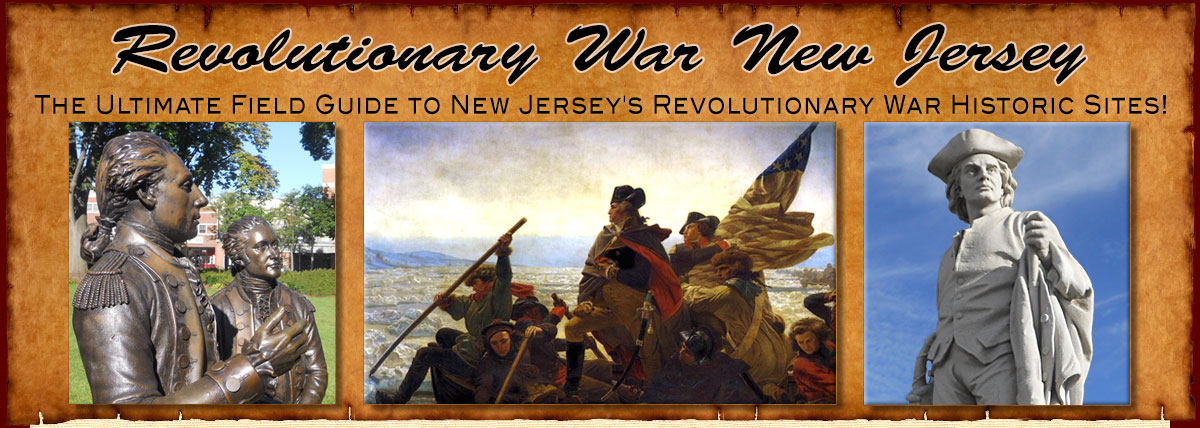

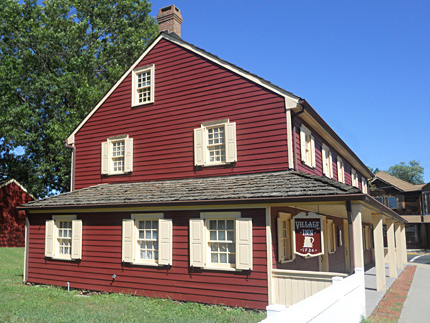
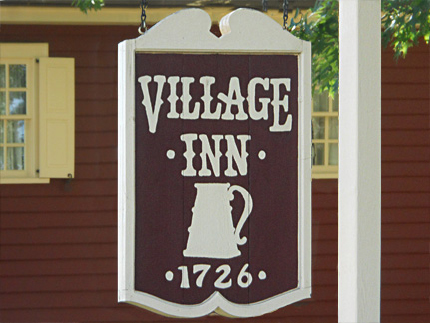
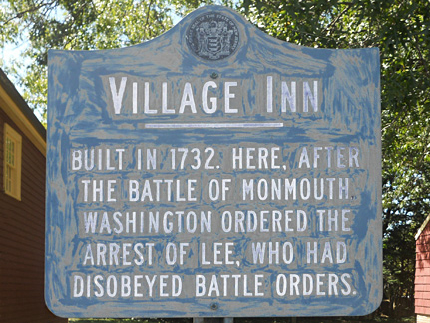
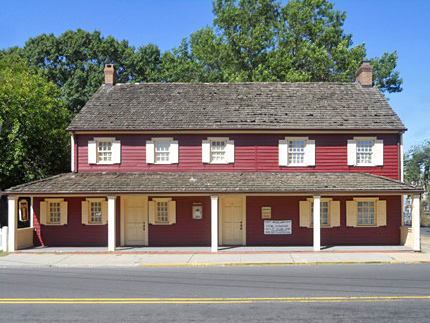
Village Inn
Main St. and Water St.
Map / Directions to Village Inn
Map / Directions to all Englishtown Revolutionary War Sites
See the Village Inn Website for information about tours and upcoming events.
June 24 - 27, 1778 / Prior to the Battle of Monmouth
Including General Charles Lee making his Headquarters in Englishtown on June 27
In June 1778, British forces were marching across New Jersey. They had abandoned Philadelphia and were marching towards New York City, the main British stronghold throughout the Revolutionary War. The Continental (American) Army had left their camp at Valley Forge, Pennsylvania, and were marching across New Jersey in pursuit of the British.
On June 24, 1778, General George Washington held a council of war with his officers in Hopewell. A plan was devised to have an advance force of troops make an attack on the rear guard of the British troops. General Washington offered the command of this advance force to his second in command, General Charles Lee, who turned it down. Lee who had only recently returned to the army after spending sixteen months in British captivity following his capture in Basking Ridge in December 1776, voiced reservations about the ability of the American army to directly attack the British. Washington gave the command to General Lafayette.
The following day, Lee changed his mind, and asked Washington to give him command of this advance force. Washington agreed. On June 27, Lee moved into Englishtown with about 5,000 troops and made his headquarters here. The British army under General Henry Clinton were about five miles away in Monmouth Courthouse (Freehold). Washington was with the remaining 7,000 troops of the Continental Army at Ponolopon Bridge in what is now Monroe Township. During the afternoon of the 27th, Washington rode to Englishtown to meet with Lee. Washington ordered Lee to attack the British the following morning if possible. [1]
General Lee and General Washington at The Battle of Monmouth, June 28, 1778
And General Washington making his Headquarters in Englishtown following the Battle
On the morning of June 28, Lee received word from Washington that he was to "bring on an engagement or attack the enemy as soon as possible unless some very powerful circumstance forbid it." [2] Lee did make the attack on the rear guard of the British forces in Monmouth Courthouse (Freehold), the beginning of the Battle of Monmouth. However, Lee retreated and was confronted by an angry George Washington on the field. The following eyewitness account of what happened next comes from Captain John Mercer, who served as an aide-de-camp to General Lee: [3]
"When we came up to General Washington, I was close by General Lee, and heard the conversation that passed between them; General Washington first accosted General Lee, by asking him: What is all this? General Lee not well hearing him, the question was repeated. General Washington in the second question asked: What all that confusion was for, and retreat? General Lee said he saw no confusion but what had arose from his orders not being properly obeyed. General Washington mentioned that he had certain information that it was but a strong covering party of the enemy. General Lee replied that it might be so, but they were rather stronger than he was and that he did not think it was proper to risk so much, or words to that purport; General Washington replied, then he should not have undertaken it and passed by him."
[Presumably, by "he should not have undertaken it," Washington meant either that Lee should not have requested to undertake the command of this advance force, or that he should not have undertaken the attack.]
The Exchange of Letters by Generals Lee and Washington - June 29 and 30
Following the Battle of Monmouth, Washington made his headquarters in Englishtown on June 29-30. During that time, an exchange of letters occurred between Lee and Washington, which led to Lee's being arrested and held for court-martial.The complete text of the five letters exchanged by Generals Lee and Washington on June 29-30 appears below.
Note the following before reading these letters:
1. The spelling, punctuation and abbreviations in these letters has not been modernized or corrected.
2. Lee addresses his superior officer Washington as "Your Excellency." In one instance, he abbreviates it to "Excy."
3. Each of these letters concluded with some abbreviated variation of "I am your most obedient and humble servant." This was a common closing among officers at the time. Both men maintain this decorum throughout this exchange, despite the heat of their dispute.
Lee wrote the first of his letters either on June 29th or early on the 30th. He mistakenly dated the letter July 1. [4]
Camp English Town July 1, 1778 [Actually June 29 or 30]
Sir
From the knowledge I have of your Excys character—I must conclude that nothing but the misinformation of some very stupid, or misrepresentation of some very wicked person coud have occasioned your making use of so very singular expressions as you did on my coming up to the ground where you had taken post—They implyed that I was guilty either of disobedience of orders, of want of conduct, or want of courage. Your Excellency will therefore infinitely oblige me by letting me know on which of these three articles you ground your charge—that I may prepare for my justification which I have the happiness to be confident I can do to the army, to the Congress, to America, and to the world in general. Your excellency must give me leave to observe that neither yourself nor those about your person, could from your situation be in the least judges of the merits or demerits of our measures—And to speak with a becoming pride, I can assert that to these manouvers the success of the day was entirely owing—I can boldly say, that had we remained on the first ground, or had we advanced, or had the retreat been conducted in a manner different from what it was, this whole army and the interests of America would have risked being sacrificed. I ever had (and hope ever shall have the greatest respect and veneration for General Washington) I think him endowed with many great and good qualities, but in this instance I must pronounce that he has been guilty of an act of cruel injustice towards a man who certainly has some pretensions to the regard of every servant of this country—And I think Sir, I have a right to demand some reparation for the injury committed—and unless I can obtain it, I must in justice to myself, when this campaign is closed, [(]which I believe will close the war) retire from a service at the head of which is placed a man capable of offering such injuries. But at the same time in justice to you I must repeat that I from my soul believe, that it was not a motion of your own breast, but instigaged by some of those dirty earwigs who will for ever insinuate themselves near persons in high office—for I really am convinced that when General Washington acts from himself no man in his army will have reason to complain of injustice or indecorum. I am, Sir, and hope I ever shall have reason to continue your most sincerely devoted humble servt
Charles Lee
Washington replied with this letter: [5]
Head Qrs English Town June 30th 1778
Sir
I received your letter (dated thro’ mistake the 1st of July) expressed as I conceive, in terms highly improper. I am not conscious of having made use of any very singular expressions at the time of my meeting you, as you intimate. What I recollect to have said, was dictated by duty and warranted by the occasion. As soon as circumstances will permit, you shall have an opportunity, either of justifying yourself to the army, to Congress, to America, and to the world in General; or of convincing them that you were guilty of a breach of orders and of misbehaviour before the enemy on the 28th Inst. in not attacking them as you had been directed and in making an unnecessary, disorderly, and shameful retreat. I am Sir your most obt servt
Go: Washington
In Lee's response, he apologizes for misdating his previous letter. However, he also misdates this letter. [6]
Camp June the 28th 1778 [Actually June 30]
Sir
I beg your Excellency’s pardon for the inaccuracy in misdating my letter—you cannot afford me greater pleasure than in giving me the opportunity of shewing to America the sufficiency of her respective servants—I trust that temporary power of office and the tinsel dignity attending it will not be able by all the mists they can raise to affuscate the bright rays of truth, in the mean time your Excellency can have no objection to my retiring from the army—I am Sir your most obt hble servt
Charles Lee
Before Washington had time to reply, Lee sent another letter to him. For the first time, Lee dates the letter correctly: [7]
Camp June 30th 1778
Sir
Since I had the honor of addressing my letter by Col. Fitzgerald to your Excellency I have reflected on both your situation and mine, and beg leave to observe that it will be for our mutual convenience that a Court of inquiry should be immediately ordered—but I could wish it might be a court martial—for if the affair is drawn into length it may be difficult to collect the necessary evidences, and perhaps might bring on a paper war betwixt the adherents to both parties—which may occasion some disagreeable feuds on the Continent—for all are not my friends, nor all your admirers—I must intreat therefore from your love of justice that you will immediately exhibit your charge—and that on the first halt, I may be brought to a tryal—and am Sir your most obt hble servt
Charles Lee
Washington's final letter to Lee that day: [8]
Head Quarters English Town June 30. 1778
Sir
Your letter by Colo. Fitzgerald and also one of this date have been duly received. I have sent Colo. Scammel, the Adjutant General to put you in arrest, who will deliver you a copy of the charges on which you will be tryed. I am Sir Yr most obt servt
Aftermath
Lee was arrested, and the sessions for the court-martial began on July 4-6 in New Brunswick. The next sessions were held on July 10 - 15 in the Old Paramus Church in what is now Ridgewood. Later sessions took place in New York State.
The court-martial included three charges against Lee:
First—For disobedience of orders in not attacking the Enemy on the 28th of June agreeable to repeated instructions.
Secondly—For Misbehaviour before the Enemy on the same day by making an unnecessary, disorderly & shameful Retreat.
Thirdly—For disrespect to the Commander in Chief in two Letters dated the 1st of July and the 28th of June.
Lee was found guilty of all three charges, but the word "shameful" was not included for the second count in the court-martial's verdict. He was sentenced " to be suspended from any command in the armies of The United States of North America, for the term of twelve months." [9]
Lee's reputation could not recover from the verdict, and in fact he never returned to the army. He died October 2, 1782 in Philadelphia.

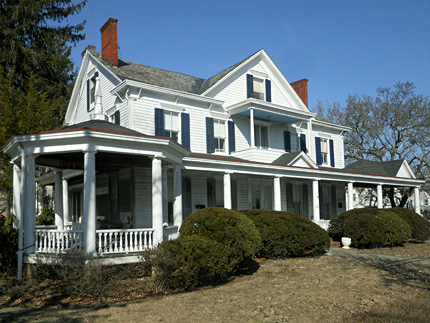
Moses Laird House
Main St. and Hamilton Rd.
Map / Directions to the Moses Laird House
Map / Directions to all Englishtown Revolutionary War Sites
This house is a private residence.
Please respect the privacy and property of the owners.
At the time of the Battle of Monmouth, this was the home of a man named Moses Laird. George Washington was a guest here on the night of June 29, 1778, the day after the Battle of Monmouth. [10]
Monmouth County suffered greatly during the Revolutionary War from raiding parties of Tories (Americans who remained loyal to the British during the war). In 1780, articles of association were drawn up, describing the methods of retaliation to be taken against the raiders. Moses Laird was one of 436 citizens of Monmouth County who signed these articles of association. [11]
Moses Laird is buried at the Old Tennent Church. [12]

1. ^ Washington's orders to Lee on the afternoon of June 27 were made verbally. Washington's letter to Congress written the following morning states, "We have a select and strong detachment more forward under the general command of Major Genl Lee, with orders to attack their rear if possible."
The letter is available to be read at the National Archives website:
“From George Washington to Henry Laurens, 28 June 1778,” Founders Online, National Archives (http://founders.archives.gov/documents/Washington/03-15-02-0620 [last update: 2015-09-29]). Source: The Papers of George Washington, Revolutionary War Series, vol. 15, May–June 1778, ed. Edward G. Lengel. Charlottesville: University of Virginia Press, 2006, pp. 578–579.
• The following works were consulted regarding the events of June 24-27:
~ Proceedings of a General Court Martial, Held at Brunswick, in the State of New-Jersey, by order of his Excellency General Washington, Commander in Chief of the Army of the United States of America for the Trial of Major General Lee, July 4th, 1778 (Philadelphia: John Dunlap, 1778)
reprinted in Collections of the New York Historical Society for the Year 1873 (New York: 1874) Pages 6-7
Available to be read at the Internet Archive here~ Samuel Stelle Smith, The Battle of Monmouth (Monmouth Beach, NJ: Phillip Freneau Press, 1964) Pages 6-11
~ Samuel Stelle Smith, The Battle of Monmouth (# 25 in the New Jersey's Revolutionary Experience series) (Trenton: New Jersey Historical Commission, 1975/1978) Pages 8-10
~ William S. Stryker, The Battle of Monmouth (Port Washington, NY, London: Kennikat Press, 1970 reissue of the work originally published in 1927)
• For more information and accompanying source notes about the other events mentioned in these three paragraphs, see the town pages linked within the text.
2. ^ Testimony of Lieutenant-Colonel Richard Meade, Aide-de-Camp to General Washington, given on July 4, 1778, during the court-martial of General Charles Lee, Proceedings of a General Court Martial, Held at Brunswick, in the State of New-Jersey, by order of his Excellency General Washington, Commander in Chief of the Army of the United States of America for the Trial of Major General Lee, July 4th, 1778 (Philadelphia: John Dunlap, 1778)
reprinted in Collections of the New York Historical Society for the Year 1873 (New York: 1874) Pages 6-8
Available to be read at the Internet Archive here3. ^ Testimony of Captain Mercer, Aide-de-Camp to Major-General Lee, given on July 19, 1778, during the court-martial of General Charles Lee, Proceedings of a General Court Martial, Held at Brunswick, in the State of New-Jersey, by order of his Excellency General Washington, Commander in Chief of the Army of the United States of America for the Trial of Major General Lee, July 4th, 1778 (Philadelphia: John Dunlap, 1778)
reprinted in Collections of the New York Historical Society for the Year 1873 (New York: 1874) Pages 112 - 113
Available to be read at the Internet Archive here4. ^ “To George Washington from Major General Charles Lee, 30 June 1778,” Founders Online, National Archives (http://founders.archives.gov/documents/Washington/03-15-02-0651 [last update: 2015-09-29]). Source: The Papers of George Washington, Revolutionary War Series, vol. 15, May–June 1778, ed. Edward G. Lengel. Charlottesville: University of Virginia Press, 2006, pp. 594–595.
5. ^ “From George Washington to Major General Charles Lee, 30 June 1778,” Founders Online, National Archives (http://founders.archives.gov/documents/Washington/03-15-02-0652 [last update: 2015-09-29]). Source: The Papers of George Washington, Revolutionary War Series, vol. 15, May–June 1778, ed. Edward G. Lengel. Charlottesville: University of Virginia Press, 2006, pp. 595–596.
6. ^ “To George Washington from Major General Charles Lee, 30 June 1778,” Founders Online, National Archives (http://founders.archives.gov/documents/Washington/03-15-02-0653 [last update: 2015-09-29]). Source: The Papers of George Washington, Revolutionary War Series, vol. 15, May–June 1778, ed. Edward G. Lengel. Charlottesville: University of Virginia Press, 2006, p. 596.
7. ^ “To George Washington from Major General Charles Lee, 30 June 1778,” Founders Online, National Archives (http://founders.archives.gov/documents/Washington/03-15-02-0654 [last update: 2015-09-29]). Source: The Papers of George Washington, Revolutionary War Series, vol. 15, May–June 1778, ed. Edward G. Lengel. Charlottesville: University of Virginia Press, 2006, pp. 596–597.
8. ^ “From George Washington to Major General Charles Lee, 30 June 1778,” Founders Online, National Archives (http://founders.archives.gov/documents/Washington/03-15-02-0655 [last update: 2015-09-29]). Source: The Papers of George Washington, Revolutionary War Series, vol. 15, May–June 1778, ed. Edward G. Lengel. Charlottesville: University of Virginia Press, 2006, pp. 597–598.
9. ^ Proceedings of a General Court Martial, Held at Brunswick, in the State of New-Jersey, by order of his Excellency General Washington, Commander in Chief of the Army of the United States of America for the Trial of Major General Lee, July 4th, 1778 (Philadelphia: John Dunlap, 1778)
reprinted in Collections of the New York Historical Society for the Year 1873 (New York: 1874) Pages 1 - 208
Available to be read at the Internet Archive here
10. ^ Plaque on the house placed by the Francis Hopkinson Chapter - Daughters of the American Revolution in 1970.
11. ^ The full text of these articles of association, including the 436 signers, is reprinted in:
John Warner Barber, Henry Howe, Historical Collections of the State of New Jersey (New York: S. Tuttle, 1846) page 371-374
(Moses Laird's name appears among the signers names in the third column on page 373)
Available to be read at the Internet Archive here12. ^ Gravestone information at the Old Tennent Church Cemetery